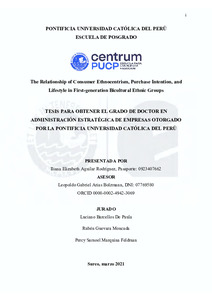| dc.contributor.advisor | Arias Bolzmann, Leopoldo Gabriel Ignacio | |
| dc.contributor.author | Aguilar Rodríguez, Iliana Elizabeth | |
| dc.date.accessioned | 2021-04-07T22:01:43Z | |
| dc.date.available | 2021-04-07T22:01:43Z | |
| dc.date.created | 2021 | |
| dc.date.issued | 2021-04-07 | |
| dc.identifier.uri | http://hdl.handle.net/20.500.12404/18761 | |
| dc.description.abstract | This study analyzed the relationship between first-generation Colombian – Canadian
bicultural ethnic consumers, their purchase intention, and lifestyles. These common types of
consumers were to make purchases depending on the lifestyle, bicultural ethnic group, and
the ethnocentric trends that might differ from the country of origin or the host country. There
were 158 surveys administered in Toronto, Canada. Structural Equation Modeling was
applied, using the Unweighted Least Squares Estimates and Maximum Likelihood Methods.
An Exploratory Factor Analysis was run using the principal axis method and Promax rotation
after conducting the multivariate normality tests, reliability, and discriminant and convergent
validity tests. The Confirmatory Factor Analysis guaranteed an adequate measurement model.
The purchase intention was explained as 85.2% for lifestyle factors, such as self-reliance and
leadership, nurturing and family orientation, household oriented and industrious, and
ethnocentrism in Colombia and Canada. It was found that lifestyle factors were not
significantly related to purchase intention. However, ethnocentrism positively impacted
Canadian product perceptions and a negative impact on Colombian products. Results showed
that lifestyles (activities, interests, and opinions [AIO]) are not always key elements in
consumer’s purchase intentions. Bicultural consumer ethnocentric trends are stronger in the
host country because consumers in a developing country accept more developed countries.
The study supported the theory of social identity (Tajfel, 1982) and optimal distinction
(Brewer, 1979), which suggests consumers would have a bias towards the country with which
they identify or experience dual or divided loyalties between the country of origin and the
host country. | es_ES |
| dc.language.iso | eng | es_ES |
| dc.publisher | Pontificia Universidad Católica del Perú | es_ES |
| dc.rights | info:eu-repo/semantics/openAccess | es_ES |
| dc.rights.uri | http://creativecommons.org/licenses/by-nc-nd/2.5/pe/ | * |
| dc.subject | Estilos de vida | es_ES |
| dc.subject | Identidad nacional | es_ES |
| dc.subject | Comportamiento del consumidor | es_ES |
| dc.title | The Relationship of Consumer Ethnocentrism, Purchase Intention, and Lifestyle in First-generation Bicultural Ethnic Groups | es_ES |
| dc.type | info:eu-repo/semantics/doctoralThesis | es_ES |
| thesis.degree.name | Doctor en Administración Estratégica de Empresas | es_ES |
| thesis.degree.level | Doctorado | es_ES |
| thesis.degree.grantor | Pontificia Universidad Católica del Perú. CENTRUM | es_ES |
| thesis.degree.discipline | Administración Estratégica de Empresas | es_ES |
| renati.advisor.dni | 07769580 | |
| renati.advisor.orcid | https://orcid.org/0000-0002-4942-3069 | es_ES |
| renati.author.cext | 0923407662 | |
| renati.discipline | 413038 | es_ES |
| renati.juror | Barcellos de Paula, Luciano | es_ES |
| renati.juror | Guevara Moncada, Ruben | es_ES |
| renati.juror | Marquina Feldman, Percy Samoel | es_ES |
| renati.level | https://purl.org/pe-repo/renati/level#doctor | es_ES |
| renati.type | http://purl.org/pe-repo/renati/type#tesis | es_ES |
| dc.publisher.country | PE | es_ES |
| dc.subject.ocde | http://purl.org/pe-repo/ocde/ford#5.02.04 | es_ES |






